How To Create A To Do List In WordPress
 If you are a business owner, there is never enough time to get things done.
If you are a business owner, there is never enough time to get things done.
There is just so much work to do and things to remember. You have clients to meet, tasks to complete, priorities to attend to, fires to extinguish, deliveries to make, schedules to keep and so on. The stress of trying to get things done on time never seems to stop.
Now … add the extra dimension of promoting and growing your business online and keeping your website updated with fresh content and everything can start feeling unmanageable and chaotic.
Whether you run a business, website, blog, or manage a project, it’s important to be able to organize and manage your daily activities.
A simple “tried and true” tool that can help you save time, alleviate stressful workloads, and allow you to regain control is to use a “to-do” list.
To-Do Lists – Benefits
A “to-do” list can help you measure your progress as you work towards your objectives. Your to-do list can be detailed and specific, or serve as a reminder of tasks that need to be done over a given period of time.
Here are just a few of the many benefits of using to do lists:
Create Order
A to do list helps you create order, keep things organized and achieve goals sooner.
Better Time Management
Prioritizing tasks on your list helps you save time and manage your workload more effectively. You can develop a clearer perspective on what is more urgent vs what is not, and what steps need to be completed first.
Log Your Work
To-do lists let you keep documented logs of what you have done. This can be used as evidence of work to clients or employers, or just as a method of helping you assess your own productivity and efficiency.
Ensures Accountability
Without accountability there is no commitment to getting things completed, and no motivation to take meaningful action. Lack of accountability can also allow excuses to creep in and influence your productivity.
Collaborate Better With Others
Creating to do lists and other project management tools is essential for working with other people on some of your larger or more complex projects.
As you can see, there are many benefits to using a to-do list, both in business and in your personal life. Creating to do lists, then prioritizing tasks and working in a focused way increases your business productivity and efficiency.
Let’s turn now to using to-do lists on your website or blog. More specifically, how to add a to do list to WordPress.
In this tutorial you are going to learn how to easily add to do lists to a WordPress website or blog to help your team get things done faster and more efficiently using a great little plugin called Cleverness To-Do List.
Cleverness To-Do List
Download URL
http://wordpress.org/plugins/cleverness-to-do-list/
Description
This WordPress plugin provides users with a to-do list feature.
Plugin Features
Note: the plugin features listed below will be discussed in more detail in the tutorial section.
You can set up the plugin with private to do lists for each user, to have all users share your to do list, or to have a master list with individual item completions.
The shared to do list option has a variety of settings available. You can delegate to do items to a specific user (this includes a setting to email new to do items to the assigned user) and optionally to have assigned items only seen by that user. You can also assign different permission levels to different users based on user roles. There are also settings available to show deadline and progress fields. Category support is included as well as front-end administration.
A new menu item is added to the admin backend to help you manage your list and your to-do list can also appear on a dashboard widget.
A sidebar widget is available as well as short code to display the to do list items on your blog. There are two shortcodes for front-end list administration. Category management is restricted to the back-end.
If you plan to set up a multi-author site you can use this to-do lists plugin to create custom to-do lists for your post planners if you also own the developer’s premium plugin, Post Planner.
Installing The Cleverness To-Do List Plugin
Log into your site’s dashboard section, and choose Plugins > Add New …
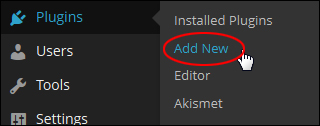
In the Install Plugins screen, type in “cleverness” into the search field and click the Enter button on your keyboard …
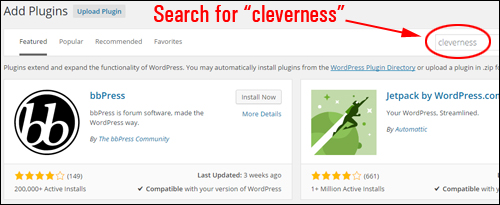
Locate the item in the Search Results tab and click Install Now …
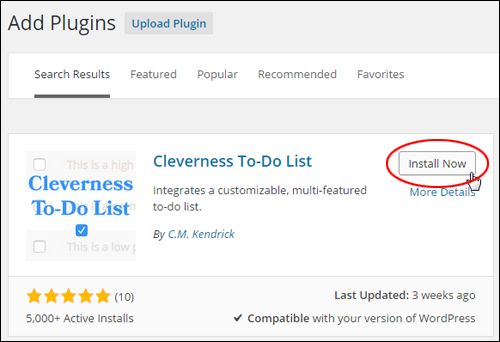
Activate the plugin …
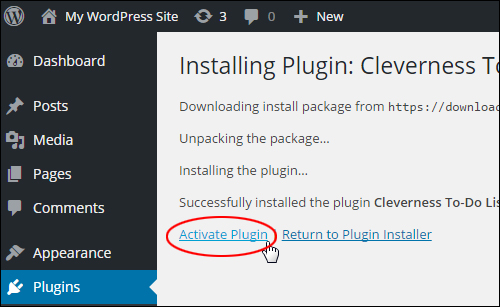
Note: You can also activate this plugin from the Plugins area …

Once the plugin has been activated, click on Settings …

Note: The plugin’s ‘Settings’ screen can also be accessed by selecting To-Do List > Settings from the admin menu …

This takes you to the ‘Settings’ section …

The section below shows you how to go through the plugin setup process …
Plugin Setup
The Settings area is divided into 4 sections:
- To-Do List Settings – This section is where you can specify the plugin’s main settings.
- Advanced Settings – In this section you can customize your to-do lists, assign tasks to other users and perform database maintenance tasks.
- User Permissions – Here you can configure user permissions and capabilities for Group and Master List types.
- Import/Export – This section lets you import and export your to-do list data and plugin settings.
Let’s configure each of these tabs.
To-Do List Settings
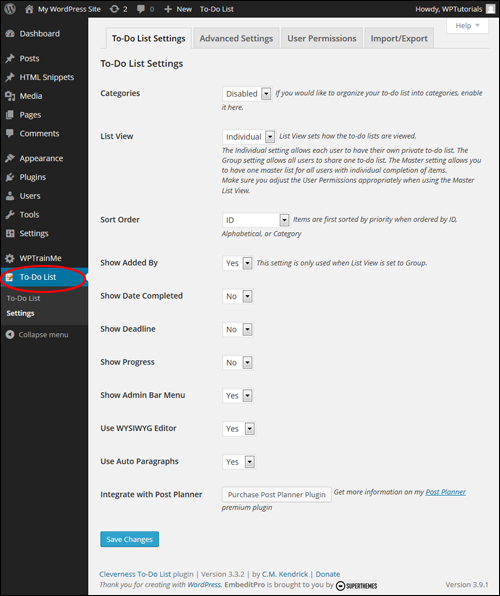
To-Do List Categories
Select ‘Enabled’ to organize your to-do list into categories, otherwise leave this option set to ‘Disabled’.
Note: If you enable this option, a ‘Categories’ item gets added to the To-Do List menu …
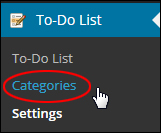
This lets you add categories that can help organize your lists (see ‘Plugin Usage’ section further below for more details) …
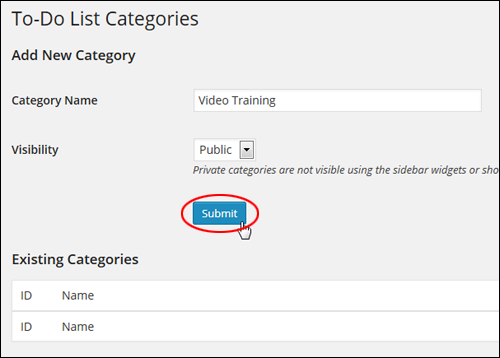
You can create ‘public’ and ‘private’ categories for your to-do lists.
Categories set to ‘private’ will not be visible when using widgets or short codes (only when ‘Sort Order’ is set to ‘Category’)
List View
List View lets you choose how to-do lists will be viewed. There are three to do list views available:
- Individual – Select this option if you want each user to be able to create and manage their own private to-do list.
- Group – Selecting this option lets all users share one to-do list.
- Master – Select this option to have a master list for all users, where users have their own individual completion of items. If using the ‘Master’ list view, make sure to adjust the User Permissions appropriately in the ‘User Permissions’ tab (see further below).
Sort Order
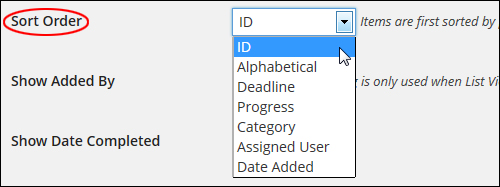
‘Sort Order’ lets you specify how to order to-do list items.
If you select ID, Alphabetical, or Category options, items will be first sorted by priority.
Show Added By
Enabling this option lets you display which of your users has added an item to the to-do list.
Note: This setting only works when ‘List View’ is set to ‘Group’.
Show Date Completed
Enabling this option (‘Yes’) displays completion dates for to-do items.
Show Deadline
If this option is enabled (‘Yes’), you can specify deadlines for to-do items …
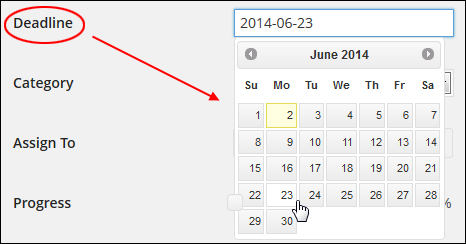
Show Progress
Enabling this option (‘Yes’) lets you specify task progress indicators for your to-do items …

Show Admin Bar Menu
If enabled, the ‘To-Do List’ menu will display in your WordPress Admin bar …

Use WYSIWYG Editor
Enabling this option lets you add and edit items on your to-do list using the WordPress WYSIWYG Editor …
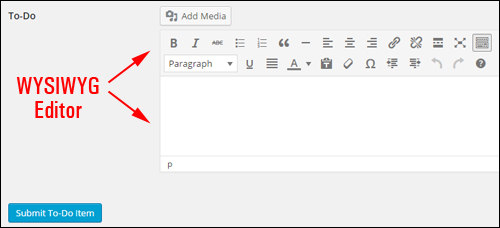
Use Auto Paragraphs
Enable this option (‘Yes’) to display content in to-do lists using paragraphs.
Integrate with Post Planner
If you plan to run a multi-author site or blog, you can integrate the Cleverness To-Do List plugin with a plugin called WordPress Post Planner, from the same plugin developer that provides you with a complete WordPress editorial solution …
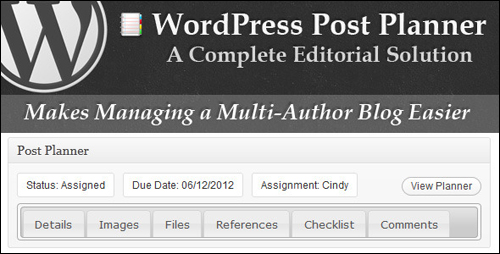
To learn more about using this plugin, visit this site: WordPress Post Planner – WordPress Plugin
Once you are done configuring your plugin options, remember to click the ‘Save Changes’ button …

Advanced Settings
After configuring the general settings, click on the ‘Advanced Settings’ tab to proceed …

This brings up the plugin’s ‘Advanced Settings’ screen …
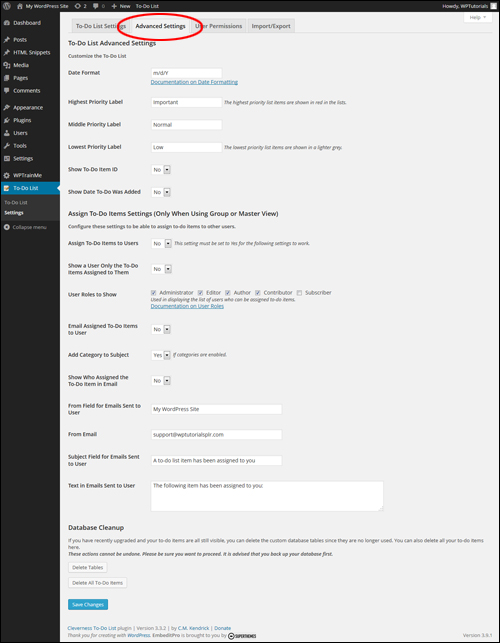
In this screen you can customize your To Do lists, assign to-do items to other users and perform plugin database maintenance tasks.
Let’s step through how to configure the plugin’s ‘Advanced Settings’ section …
To-Do List Advanced Settings > Customize The To-Do List
Here you can customize your To Do List …
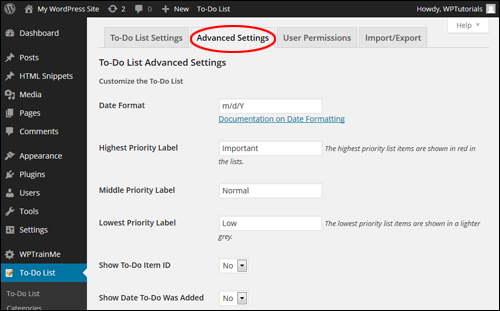
The following settings can be configured in this section:
Date Format
This section lets you specify how to display dates in your to-do lists (e.g. month/day/year, day/month/year, etc.)
Note: To learn more about formatting dates in WordPress, see the date section of the WordPress Codex below:
WordPress Codex – Formatting Date And Time
Priority Labels
Here you can customize your labels for prioritizing highest (important), middle (normal) and lowest items …

Highest (important) priority items are colour-coded in red in the lists and lowest (low) priority items display in a lighter shade of grey …
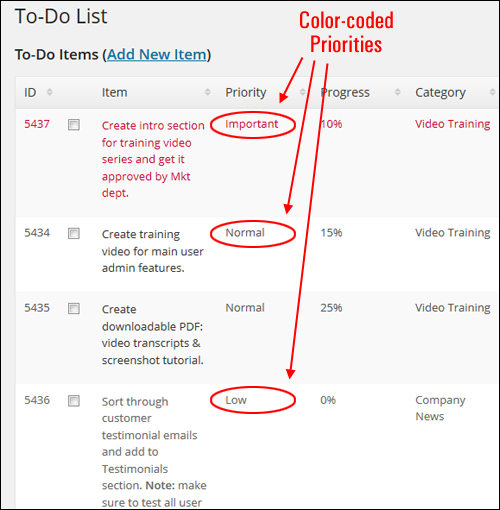
Show To-Do Item ID
Enabling this option shows item IDs on the to-do list …
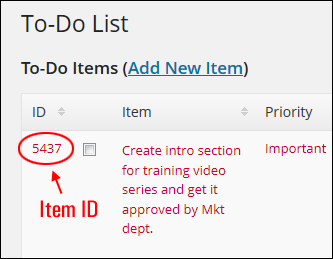
Show Date To-Do Was Added
If this option is enabled, the date your to-do list was added displays on your To-Do Items table …
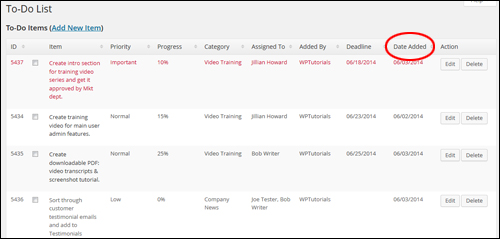
To-Do List Advanced Settings > Assign To-Do Items Settings
If you have selected ‘Group’ or ‘Master’ View for your to-do list, you can configure the settings in this area and assign items to other users …
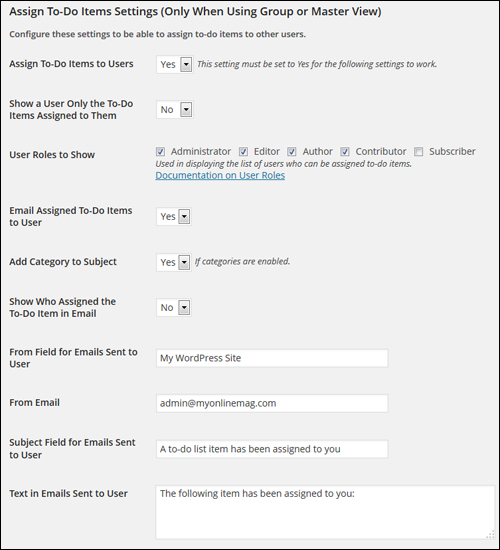
The following options can be configured in this area:
Assign To-Do Items to Users
Enable this option to assign tasks to other users …
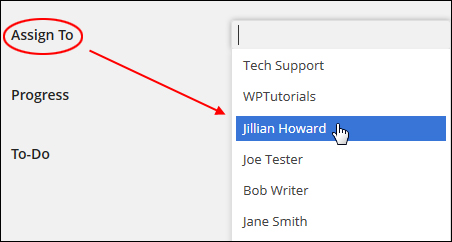
Note: This set this option to ‘Yes’ for the settings below it to work.
Show a User Only the To-Do Items Assigned to Them
Enable this option (‘Yes’) to display to-do items only to users who have been assigned those items. Leave this option disabled (‘No’) to display items to all users.
User Roles to Show
Checking the boxes in this section (Administrator displays the type of users that can be assigned todo items. If you do not want to assign to-do items to a particular role, then don’t tick its checkbox.
Email Assigned To-Do Items to User
If this option is enabled, WordPress will automatically send users an email with their assigned to-do items …
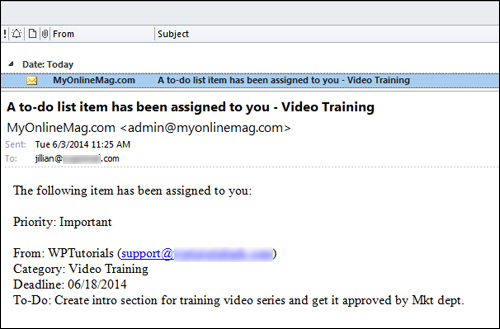
Leave this option disabled if you don’t want to send out emails to users.
Note: If this option is disabled, you can skip the remaining settings in this section.
Add Category to Subject
If you have enabled categories in your plugin settings and select ‘Yes’ for this option, the to-do category will display on the subject of your emails …
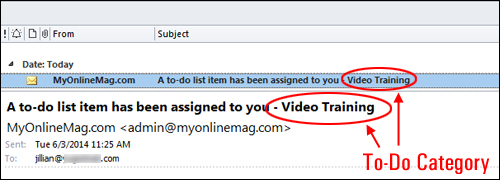
Leave this option disabled (‘No’) if you don’t want to-do categories added to the subject of your emails.
If you don’t want to show to-do categories in the subject of your emails, then leave this option disabled.
Show Who Assigned the To-Do Item in Email
Enable this option (‘Yes’) to display the user who assigned the to-do item in the email. This is a useful option if your website has a number of project managers assigning to-do items to users …

From Field for Emails Sent to User
This field allows you to customize the “From” field when sending out emails to users. Add your company name, your domain, your name, or anything you like into this field …

From Email
Add the email address that you would like showing as the “sent from” address …

Subject Field for Emails Sent to User
Type in a subject field for the email that will be automatically sent to users when new items have been assigned in your to-do list …

Text in Emails Sent to User
Add into this field the body of the email message that will be sent out automatically to users when a new item has been assigned to your to-do list.

To-Do List Advanced Settings > Database Cleanup
This area of the ‘Advanced Settings’ tab lets you perform database maintenance operations associated with plugin data inside your plugin settings area itself without having to access your server …

This is useful if, for example, you see that todo items you have deleted are still appearing on your site.
You can perform the following tasks in this section:
- Delete Tables – Delete any custom database tables that are no longer being used.
- Delete All To-Do Items – Delete all to-do items.
![]()
Any actions that you perform on the database from this screen cannot be reversed. If you are sure that you want to carry out database operations in this section, then we recommend backing up your database first.
If you don’t want to perform site backups, then consider getting assistance from a WordPress professional, or use backup plugins. You can learn more about a great WordPress backup plugin that we recommend using to completely automate your WordPress site backups here:
User Permissions
This section lets you configure user permissions and capabilities for Group or Master List types …

![]()
If you have chosen the Individual List type, the only setting applicable in this section is the View To-Do List option …
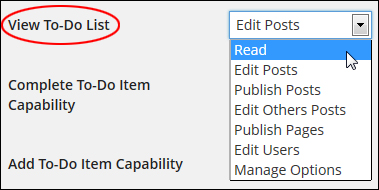
If you are setting up user permissions and capabilities for Group or Master List types, select the highest level capabilities that you would like users to have access to for each option …
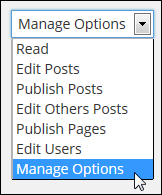
By default, general capabilities of each user role are set as follows:
- Subscribers: Read
- Contributors: Edit Posts
- Authors: Publish Posts
- Editors: Edit Others Posts
- Administrators: Manage Options
Note: When working with the Master list type make sure that you only allow non-administrators to view and complete items, otherwise they will be able to edit the Master list itself.
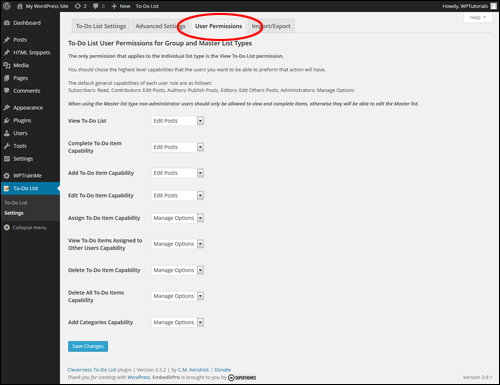
Let’s go through the settings for the User Permissions tab:
View To-Do List
This enables the chosen capability to view to-do items in the dashboard widget and on the To-Do List page under the ‘Tools’ section.
Complete To-Do Item Capability
Here you can allow the selected capability to mark items as completed or uncompleted.
Add To-Do Item Capability
Here you can enable the selected capability to add new to-do items.
Edit To-Do Item Capability
This setting allows the chosen capability to modify existing items.
Assign To-Do Item Capability
This permits the selected capability to assign items to individual users.
View All Assigned Tasks Capability
This setting allows the chosen capability to view all tasks even if “Show Each User Only Their Assigned Tasks” is set to ‘Yes’.
Delete To-Do Item Capability
This setting permits the selected capability to delete individual items.
Delete All To-Do Items Capability
This allows the chosen capability to purge all the completed items.
Add Categories Capability
Here you can permit the chosen capability to add new categories.
Import/Export
Being able to import and export to-do list data can be useful. For example, you may decide to copy over data from one website to another, or store your data for backup or archiving purposes.
To access this function, click on the ‘Import/Export’ tab in your plugin settings area …

Use this section to easily import or export your data and plugin settings …
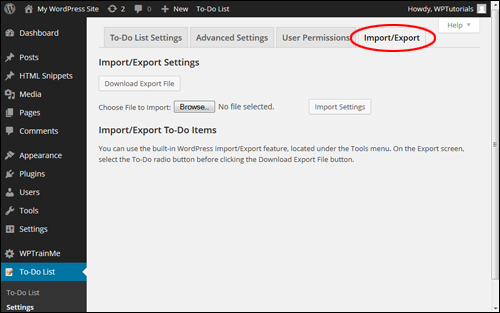
Exporting To-Do List Data
To export and download your data settings click on the ‘Download Export File’ …

This opens up a window allowing you to view or save your data in a plain text file (e.g. Notepad) to an internal or external storage medium …
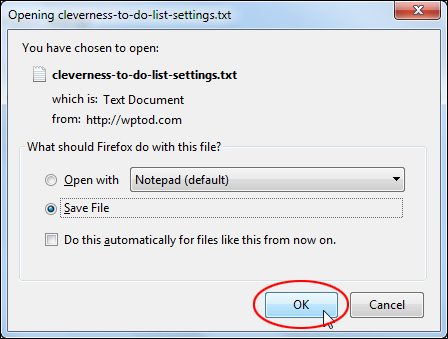
As well as exporting list data from the ‘Import/Export’ section, you can also export data by going to your WordPress dashboard menu and selecting Tools > Export …
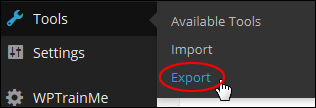
You can include to-do list data in a WordPress export file (in XML format), either by selecting ‘All content’ (includes everything – posts, pages, etc…), or just select ‘To-Do’ from the ‘Choose what to export’ section and click on the ‘Download Export File’ button to save your file to an internal or external hard drive…
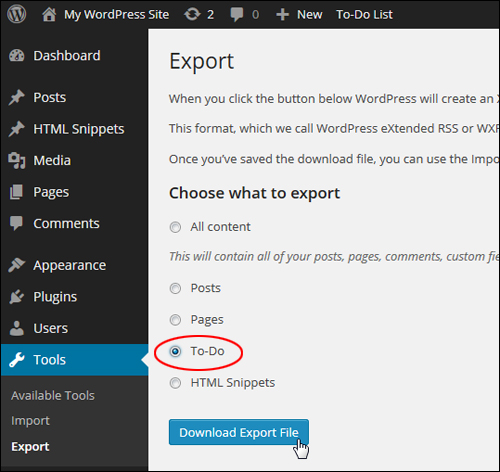
Importing To-Do List Data
Importing a previously saved to-do list data file is easy. Just click on the ‘Browse’ button next to the ‘Choose File to Import’ field …

Select the file and click ‘Open’ …
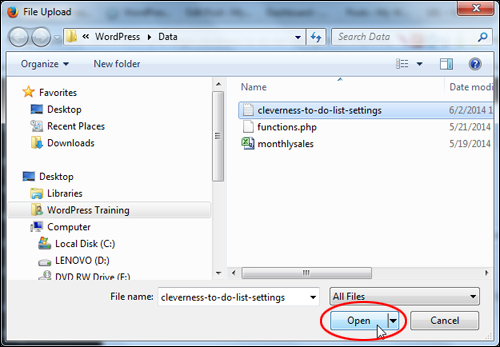
Once uploading your data file, click on the ‘Import Settings’ button …

The data from the existing to-do file will be imported.
After configuring all plugin settings, you are ready to begin creating and editing to do lists.
How To Use The Cleverness To-Do List Plugin
To create a new to do list, log into your WordPress admin, then scroll down the menu and click on To-Do List > To-Do List …
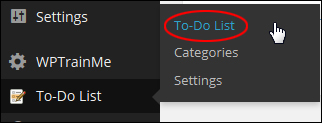
This brings you to the ‘To-Do List’ screen …
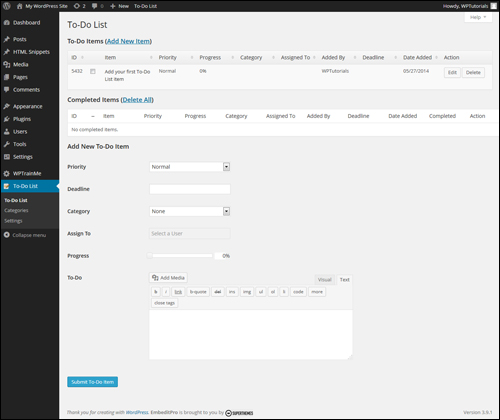
Add New Items To Your List
There are several ways to add new to-do items to your list.
For example, you can add new to-do items from your dashboard toolbar …

You can also add new to-do items to your list inside the Dashboard by clicking on the ‘Add To-Do item’ link …
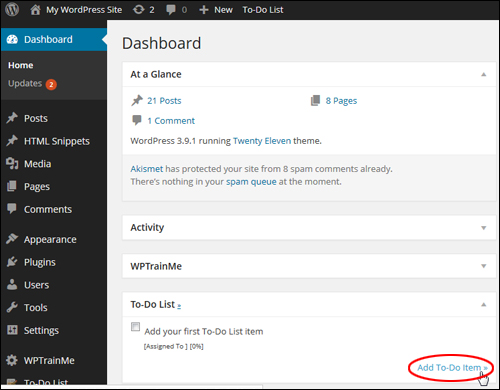
You can also click on the ‘Add New Item’ link in the ‘To-Do Items’ section (note: only use this option if your To-Do list contains many items, since the link is only going to take you to the “Add New To-Do Item” section further down the page) …

The above methods will bring you to the ‘Add New To-Do Item’ area.
Depending on the way you have configured the plugin’s settings, some options may not display when new items to your to-do list.
Select the options you have enabled for your to-do items, enter appropriate information into the relevant fields and click on the ‘Submit To-Do Item’ button to add the to-do item …
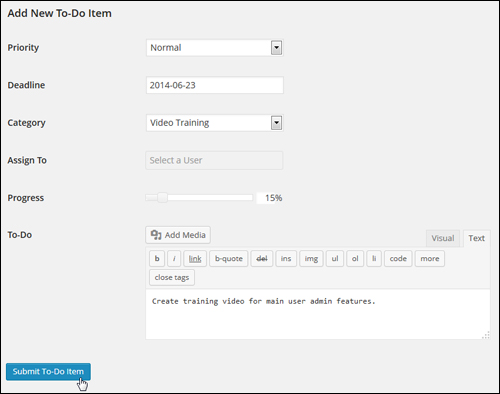
Note: If you have chosen a list type that lets you assign items to users, select a user from the drop-down list and assign them the item …
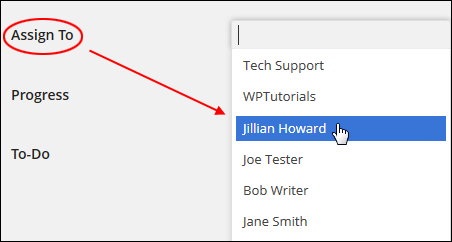
You can also make multiple users responsible for the same item (click on ‘x’ to remove users) …

After you have added the new item, the item will be listed as an entry in the ‘To-Do Items’ table …

Repeat the above process to continue adding new items to your to-do list …
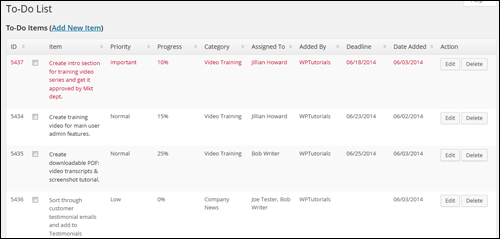
Edit And Delete Items
To edit or delete an item, click on the ‘Edit’ or ‘Delete’ buttons associated with each item under the ‘Action’ column …

Depending on how you have set up the plugin (see previous section), users assigned to tasks may also receive an email notification in their inboxes …
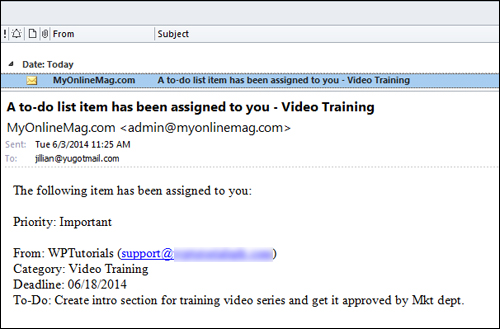
Once you have created your to do list, users can view it when logged into their dashboard …
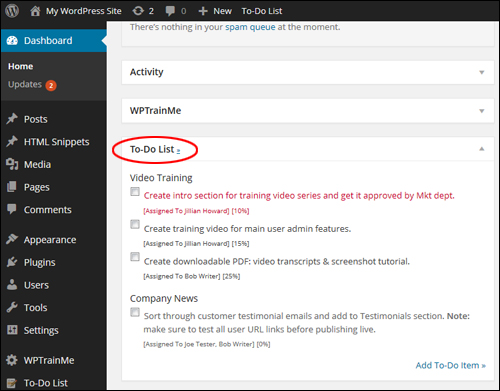
When the user assigned with an item completes the task and ticks the item check box …
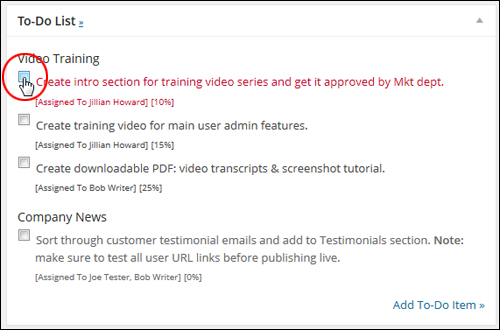
… the item is removed from the “To-Do” list …
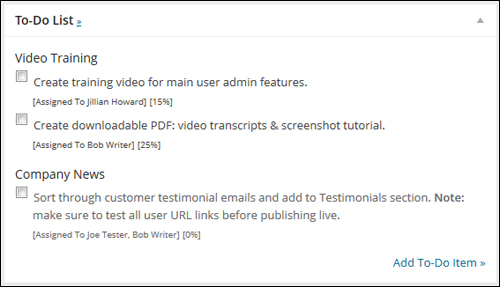
And appears in the ‘Completed Items’ section located in the ’To-Do List’ plugin screen …

Additional Plugin Information
The Cleverness To-Do List plugin provides additional functions that let you display to-do lists on your WordPress website using widgets, and display a list on content inside a post or page using shortcodes.
Using The Plugin Widget
To add a to-do list to your site using widgets, go to the ‘Widgets’ section (Appearance > Widgets) and drag the ‘To-Do List’ widget to the menu location where you would like your list to appear …

Configure the widget settings and click ’Save’ to update your settings …
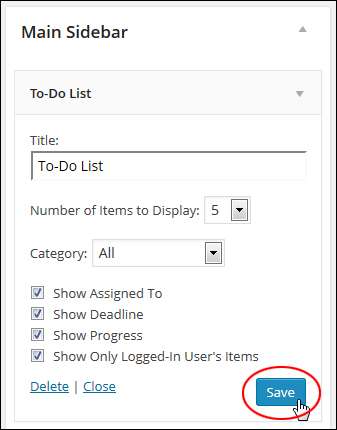
The to-do list will display wherever the widget has been inserted (i.e. the sidebar menu, footer, etc.)
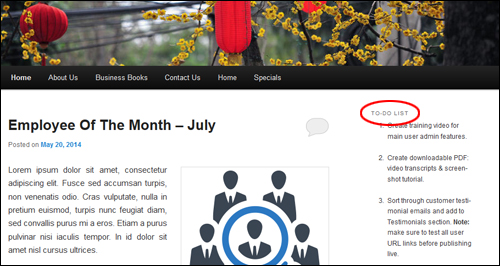
To learn more about using WordPress widgets, see the tutorial below:
Using The Cleverness Plugin Shortcodes
You can also display to-do lists to your site with short codes.
To access the documentation on using shortcodes, click on To-Do List > To-Do List from your admin menu …
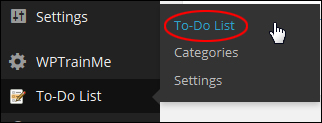
Click the ‘Help’ tab on the corner of your screen …
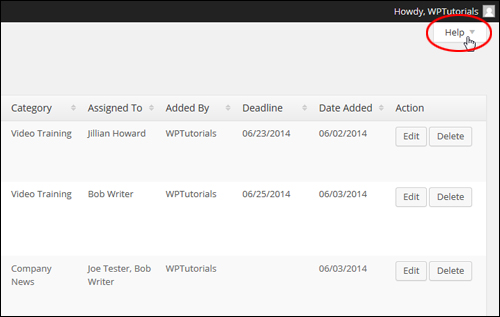
Click on the ‘Shortcodes’ menu entry to access the Shortcode Documentation section …
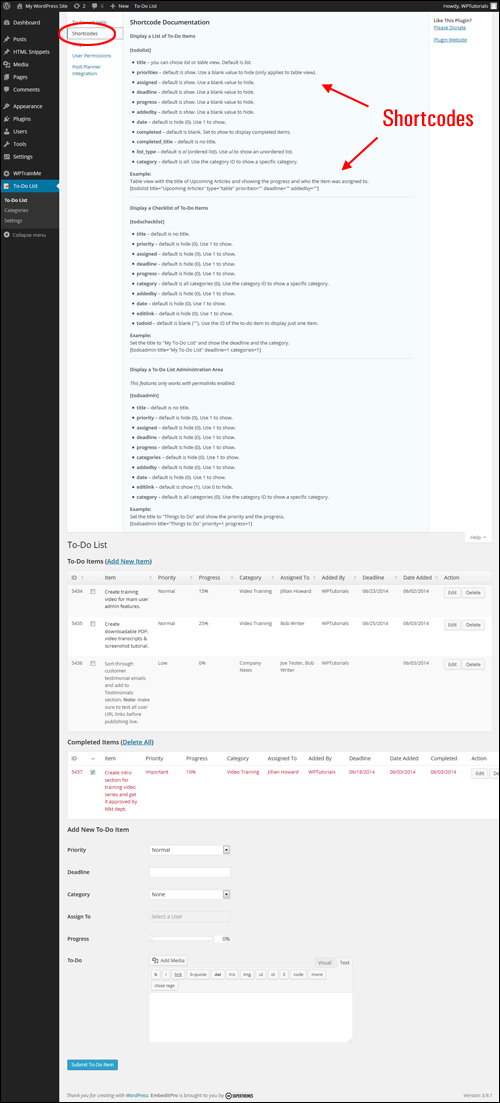
This documentation section explains different ways to configure and use shortcodes for displaying lists and checklists on your content.
Once you know what information you would like to display on your site, create a new page or post and either type or paste the short code into the content area …
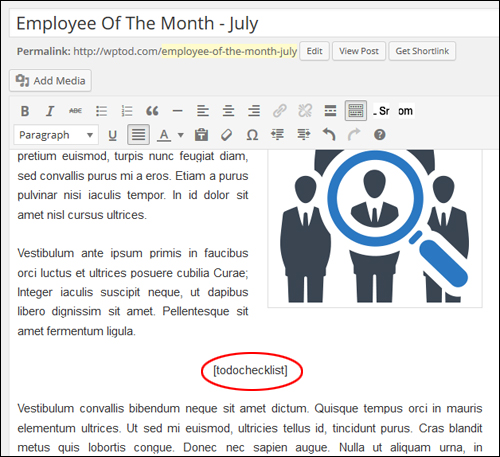
After publishing your post or page, you will see the list displayed in the location where you have inserted the shortcode …
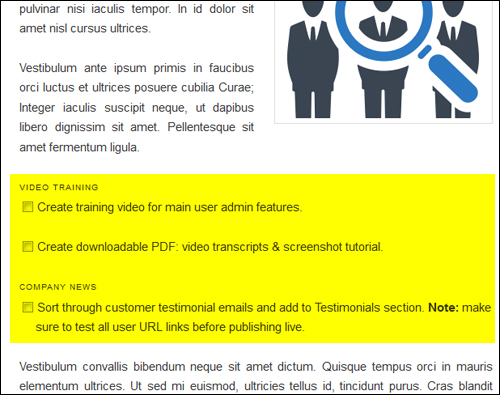
Visit this site for more details about this plugin:
Congratulations! Now you know how to create and add to-do lists in WordPress.
***
"Wow! I never knew there's so much to learn about WordPress! I bought one of the WordPress for Dummies three years ago, such authors need to be on this course!" - Rich Law, Create A Blog Now
***


